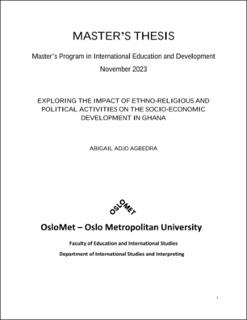| dc.description.abstract | This thesis explores and analyses the intricate relationship between ethnoreligious mechanisms, political activities, and their mutual impact on the socio-economic development of Ghana. Against the backdrop of the diverse ethnic and religious landscape of the fourth republic of Ghana, coupled with a history of political changes, the study aims to determine the complex ways these elements shape the nation's developmental process. The research employs a mixed-methods approach, combining qualitative and quantitative analyses to carefully examine the political mechanisms of the Fourth Republic, its current state, and likely future trends. The study uses electoral results, archival research, case studies, and a subjective approach to find critical factors influencing the relationship between ethnoreligious and political parties and their role in shaping social integration, government structures, and economic policies. The exploration covers a wide range of variables, including but not limited to the importance of ethnicity and religion in Ghana, the influence of ethnic and religious beliefs in shaping public policies, the impact of political power struggles since the fourth republic, and the role of cultural identities. Also, the research examines the perceptions and experiences of various stakeholders, from Ghanaian electorates to political leaders and parties, to provide a holistic understanding of the complexities involved. The findings of this research suggest that Ethnicity and religion are so important in the lives of Ghanaians that they influence, however minimal, political discourse, refuting the assumption that these elements are the only constant variable in Ghanaian politics. In addition, the involvement of social identities in Ghanaian politics showcases the Ghanaian community's cultural diversity and social cohesion. Finally, ethnoreligious, and political activities prove dysfunctional in Ghanaian politics in terms of ethnic divisions, religious discrimination, and economic inequalities. | en_US |
